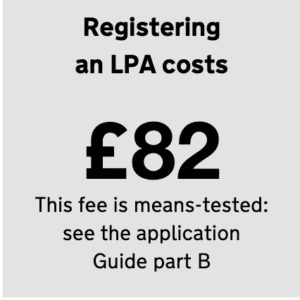The Donor is the person who appoints someone to act under the Power of Attorney (POA). This article is a general guide for the Donor on how to choose the right attorney, how to revoke the attorney, setting up a Lasting Power of Attorney and how much it costs?
Although, usually, someone might not think about appointing an attorney until later in life, you never know when you might lose capacity, even if it is temporary.
Generally, losing capacity is associated with brain damage or dementia but there are times when you might be unable to make a decision. So start thinking about appointing an attorney in good time.
Who can I choose?
Being an attorney is an onerous task and gives a great deal of power and responsibility so you should think carefully about whether you can trust the person you are appointing. Who do you trust? Choosing your Power of Attorney The attorney must be aged over 18 and must have mental capacity to make their own decisions. They cannot be subject to bankruptcy. They do not need to live in the UK or be a British citizen.
The attorney can be a family member, a spouse, a civil partner, a friend or a professional, such as a solicitor or an accountant. Whoever you choose, you need to know that they are up to the job and you should also give them time to think about whether they want the role.
Can I appoint more than one Attorney?
Yes, you can appoint more than one Attorney. You will need to decide, however, whether the joint attorneys will act:
- jointly, in which case they will need to make decisions together on all matters; or
- jointly and severally, where they may act together or separately
You can specify whether the joint attorneys have to work together on certain more complex financial decisions, for example, and jointly and severally on other decisions. It is a good idea to consider how well the attorneys will work together.
You may also want to consider appointing a replacement attorney in case something happens to the original attorney.
How to choose a POA
When choosing a POA, you may want to think about:
- how well they look after their own affairs, for example, their finances
- do they own any property
- do they run their own business
- are they familiar with tax affairs
- how well do you really know them
- do you trust them to make decisions in your best interests
- how capable will they be to make decisions for you
There are five principles that an attorney must abide by – you can read more in How to act as an Attorney.
It can be difficult when you have family and you want to appoint one or more of your children. This can cause sibling rivalry and disagreements. A word of caution: do not appoint all of your children jointly just to avoid upsetting one of them. If there are too many attorneys who don’t work well together, it may be difficult for them to agree on what is in your best interests.
What if you have business concerns?
If you have any business concerns, you may want to consider how these interests are going to be represented. People usually associate a Power of Attorney with personal finance but, if you appoint an attorney and don’t specify, they will need to look after your business affairs as well. They will be able to do this if you are a self-employed sole trader but not if you have a limited company. For more information on an Attorney for Business see My Business POA
Does my POA get paid?
The attorney has a statutory right to claim expenses such as travel, postage or phone calls, and can pay themselves for the expenses out of the Donor’s money. They are not usually paid for their services although they can pay for professional services as an expense – for example, if they need an accountant to do the self-assessment tax return for the Donor.
If you have any sort of business activity you should consider whether to leave instructions that your attorney can be paid under certain circumstances. Even if you have, for example, some letting properties or holiday lets, consider if your attorney should be paid.
How much does it cost?
In England & Wales it costs £82 to register an attorney or £41 for a repeat application, unless you get a reduction or exemption.
Exemption / remission
If you receive certain means-tested benefits when you apply to register, you won’t have to pay anything. If your income before tax is less than £12,000 a year, you’ll qualify for a 50 per cent remission.
Revoking an Attorney
If you decide that you no longer want an attorney to act for you, you will need to inform the Office of the Public Guardian (OPG). You can revoke the Power of Attorney only, however, if you still have mental capacity. If you have lost capacity, you can no longer revoke the power.
If a family member or other relevant person becomes concerned about an attorney and whether they are carrying out their duties properly, they can complain to the OPG. They will need to use form OPG130 – but only if the Donor has lost capacity. If the Donor still has capacity, they can revoke the attorney’s role.
To revoke an attorney see our article Revoking your attorney.
